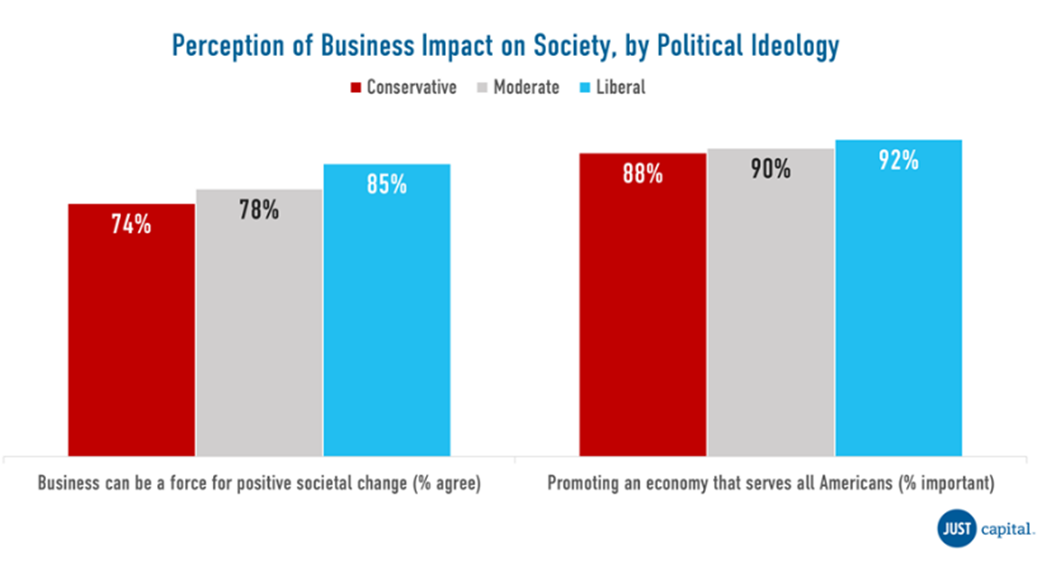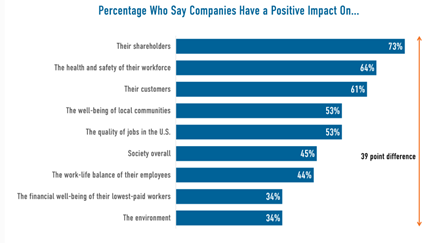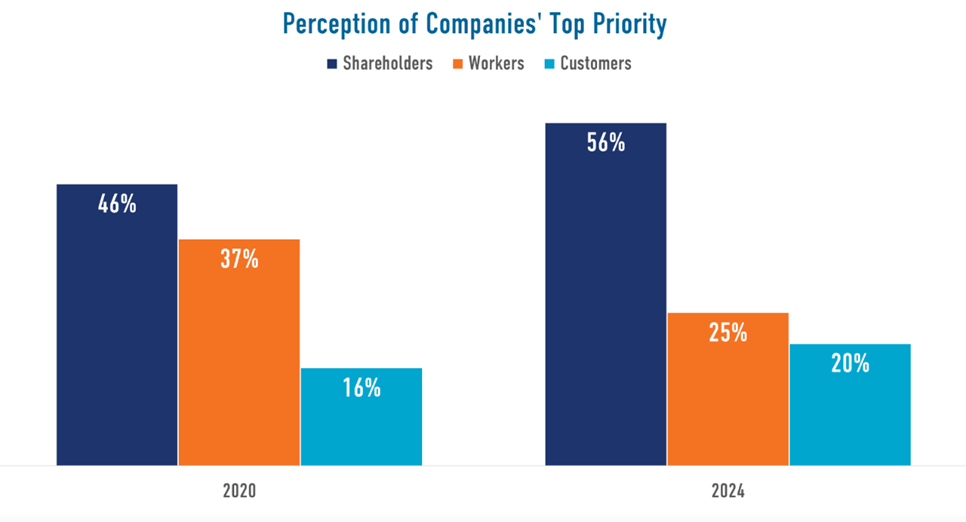JUST Capital Survey—Most Americans Favor Stakeholder Capitalism Principles
Most Agree—Capitalism Can Do a Better Job of Creating Value
Summary of Other Key Findings
Most Americans – regardless of their political party, ideology, or other demographic differences – agree that “business can and should be a force for
.png) good in the world.” That means “paying people fairly, investing in their workforce, treating customers better, offering products or services at a fair price, minimizing harm to the environment, strengthening communities, and even making good on climate commitments.”
good in the world.” That means “paying people fairly, investing in their workforce, treating customers better, offering products or services at a fair price, minimizing harm to the environment, strengthening communities, and even making good on climate commitments.”The definition for stakeholder capitalism, which was published in Forbes in August 2020 by Alex Edmans, Professor of Finance and London Business School and Bruce Bolger, CEO and Founder of the Enterprise Engagement Alliance, is “enhancing returns for investors only by creating value for customers, employees, supply chain and distribution partners, communities, and the environment.”
The JUST Capital 2024 Americans’ Views on Business Survey is based on a survey of 3,008 Americans – a sample reportedly representative of the US adult population – between July 10 and July 16, 2024. The quantitative research is by “SSRS, an objective, nonpartisan research institution that provides scientifically rigorous statistical surveys of the US population.”
Most Agree—Capitalism Can Do a Better Job of Creating Value
The survey did not ask people to define stakeholder capitalism or explain how they feel about it. Instead, it asked them about its key principles without giving it a name. According to the survey, Americans of all political views think that US companies can do a better job of meeting the needs of both their shareholders and stakeholders, and that addressing the interests of employees and customers is well below that of shareholders in their general priorities. There is much less interest today in having CEOs getting involved with making political statements unless directly related to the interests of the organization.
“On transparency and disclosure, it is clear that in today’s low-trust environment, people hunger for more information on what companies are actually doing, not what they say they are doing. Despite the broad agreement that capitalism and the economy need to work for all Americans, opinions clearly diverge on whether this is actually happening.”
The study authors emphasize: “The American people want companies to create value for all their stakeholders as a path to creating more value for their shareholders, for themselves, and for society at large. As our investment work demonstrates, this ‘win-win-win’ is not mere conjecture; it’s a fact. This report serves as a blueprint for any corporate leader, board member, or investor who aspires to this outcome.”
Summary of Other Key Findings
Americans generally believe that companies prioritize shareholders with less emphasis on other stakeholders, and little on society, work-life balance, the financial well-being of the lowest paid employees and the environment.

Stakeholder capitalism principles appeal to people of all political stripes. Large majorities of respondents believe that business can be positive societal force and that promoting an economy that serves all Americans is important.

Despite the Business Roundtable pronouncement in favor of stakeholder capitalism principles in 2019, the perception that companies favor shareholders has only grown since then.

A large percentage of Americans agree that capitalism isn’t working for the average American.

Enterprise Engagement Alliance Services
 Celebrating our 15th year, the Enterprise Engagement Alliance helps organizations enhance performance through:
Celebrating our 15th year, the Enterprise Engagement Alliance helps organizations enhance performance through:1. Information and marketing opportunities on stakeholder management and total rewards:
- ESM Weekly on stakeholder management since 2009. Click here to subscribe; click here for media kit.
- RRN Weekly on total rewards since 1996. Click here to subscribe; click here for media kit.
- EEA YouTube channel on enterprise engagement, human capital, and total rewards since 2020
 Management Academy to enhance future equity value for your organization.
Management Academy to enhance future equity value for your organization.3. Books on implementation: Enterprise Engagement for CEOs and Enterprise Engagement: The Roadmap.
4. Advisory services and research: Strategic guidance, learning and certification on stakeholder management, measurement, metrics, and corporate sustainability reporting.
5. Permission-based targeted business development to identify and build relationships with the people most likely to buy.
Contact: Bruce Bolger at TheICEE.org; 914-591-7600, ext. 230.














